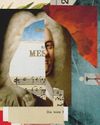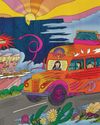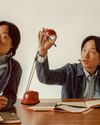
I was at the kitchen counter making coffee when my daughter Miranda’s dog approached. Ringo stands about 10 inches high at the shoulder, but he carries himself with supreme confidence. He fixed his lustrous black eyes on mine. Staring straight at me, he lifted his leg and urinated on the oven door.
After the mess was cleaned up, I complained to Miranda, “I don’t think Ringo likes me.”
Miranda replied, “Ringo loves you. He just doesn’t respect you.”
Theoretically, Ringo is a Cavalier King Charles spaniel. You may have seen depictions of the breed peeking at you from portraits of monarchs and aristocrats. But the spaniels in the paintings are almost always the cinnamon-and-white variety known as a Blenheim spaniel. My wife, Danielle, has a Blenheim. The Blenheim Cavalier is a true lapdog: easygoing, obedient, insinuating. Ringo is very different. He is exactly the color of a cup of espresso, mostly black-haired with a little brownish tinge at his extremities. He’s commonly mistaken for a miniature Rottweiler. That confusion is less absurd than it sounds. If an unwelcome stranger steps in his way, 18-pound Ringo will stiffen and growl, murder in his eyes.
Ringo came into my life in the spring of 2018. Miranda had returned to the United States after four years living in Israel. She had thought seriously about staying there, but then the romantic relationship that had kept her in the country ended. Miranda was cast alone upon the open world. She relocated to Los Angeles to start over.
She chose L.A. because the landscape reminded her of Israel, even if the people were as different as could be. “My Israeli friends criticize Los Angeles as so fake,” she told me. “But let me tell you, fake nice is a lot better than authentic rude.”
Bu hikaye The Atlantic dergisinin May 2024 sayısından alınmıştır.
Start your 7-day Magzter GOLD free trial to access thousands of curated premium stories, and 9,000+ magazines and newspapers.
Already a subscriber ? Giriş Yap
Bu hikaye The Atlantic dergisinin May 2024 sayısından alınmıştır.
Start your 7-day Magzter GOLD free trial to access thousands of curated premium stories, and 9,000+ magazines and newspapers.
Already a subscriber? Giriş Yap

JOE ROGAN IS THE MAINSTREAM MEDIA NOW
What happens when the outsiders seize the microphone?

MARAUDING NATION
In Trumps second term, the U.S. could become a global bully.

THE GENDER WAR IS HERE
What women learned in 2024

The Weirdest Hit in History
How Handel's Messiah became Western music's first classic

ONE FOR THE ROAD
What I ate growing up with the Grateful Dead

HOW THE IVY LEAGUE BROKE AMERICA
THE MERITOCRACY ISN'T WORKING. WE NEED SOMETHING NEW.

Against Type
How Jimmy O Yang became a main character

Catching the Carjackers - On the road with an elite police unit as it combats a crime wave
On August 7, 2022, Shantise Summers arrived home from a night out with friends around 2:40 a.m. As she walked from her car toward her apartment in Oxon Hill, a Maryland neighborhood just southeast of Washington, D.C., she heard footsteps behind her. She turned and saw two men in ski masks. One put a gun to her face; she could feel the metal pressing against her chin. He demanded her phone, wallet, keys, and Apple Watch. She quickly handed them over, and they drove off in her 2019 Honda Accord.

The Most Remote Place in the World - Point Nemo is Earth's official "middle of nowhere." A lot seems to be going on there.
It’s called the “longest-swim problem”: If you had to drop someone at the place in the ocean farthest from any speck of land—the remotest spot on Earth—where would that place be? The answer, proposed only a few decades ago, is a location in the South Pacific with the coordinates 48 52.5291ᤩS 123 23.5116ᤩW: the “oceanic point of inaccessibility,” to use the formal name. It doesn’t get many visitors. But one morning last year, I met several people who had just come from there.

The Elite College Students Who Can't Read Books - To read a book in college, it helps to have read a book in high school.
Nicholas Dames has taught Literature Humanities, Columbia University's required greatbooks course, since 1988. He loves the job, but it has changed. Over the past decade, students have become overwhelmed by the reading, College kids have never read everything they're assigned, of course, but this feels different. Dames's students now seem bewildered by the thought of finishing multiple books a semester. His colleagues have noticed the same problem.